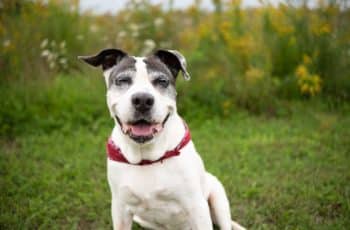Cocker Spaniels are adorable, fun, intelligent, and many snore like a buzzsaw. Over the last 30+ years of being a Cocker Spaniel mom, I’ve learned to take comfort in the dog snoring that lulls me to sleep most nights. Pet parents often ask in my Club Cocker Facebook group, “why does my Cocker Spaniel snore loud and is it normal?”
I’ve talked to veterinarians about my living with dog snores over the past three decades. In some situations, it is completely normal. However, some cases or snoring may indicate an underlying medical problem, upper airway problem, or other household reasons that may surprise you. Here’s what you should know.
What Exactly is Snoring?
Like people, dogs snore for a variety of reasons. It helps to understand what snoring is. Medically speaking, snoring is the vibration of the soft tissue of your dog’s upper airway. The sound produced by this vibration is called a snore.
When your doggy snores, the back of the roof of the mouth (soft palate) and the dangling structure at the back of the mouth (uvula) vibrate when your dog inhales air.
My Cocker Spaniels never seem in outward distress when they are snoring.
Is it Normal for Cocker Spaniels to Snore?
Cocker Spaniels, both English Cockers and American Cockers, are not brachycephalic dogs. Dogs with short noses or flat faces are called brachycephalic. These breeds include French Bulldogs, Shih Tzu, Boston Terriers, Boxers, Pugs, and English Bulldogs.
American Cocker Spaniels tend to have a shorter snout than their English Cocker counterparts. Either way, it is normal for some Cocker Spaniels to snore.
My female Cocker Spaniel, Brandy Noel, did not snore much. When she did snore, it was a delicate whisper, almost cat-like. My male Cocker Spaniels prefer a freight train, chainsaw-type sound that doesn’t bother me. A snoring dog is very comforting to me.
Fun fact: If my spouse snores, it wakes me up, and I beg her to roll over and stop snoring.
Yes, it can be very normal for Cocker Spaniels to share. If your dog snores from time to time or is in a deep sleep and you hear snores, it isn’t uncommon.
Because Cocker Spaniels have shorter snouts and soft palates, it can sometimes make it difficult for them to breathe properly. This can result in snoring, especially when they are sleeping or relaxed.

Why Does My Cocker Spaniel Dog Snore Loud: Top 14 Reasons
Here are the most common causes of loud snoring in Cocker Spaniels and most dogs. If your dog has never snored and suddenly starts, it’s always best to see the veterinarian for a checkup and discuss your concerns.
Take a video of your dog snoring, and be sure to have the phone close to your dog so your veterinarian can see and hear the snores your dog makes.
Weight
Overweight dogs are more likely to snore loudly due to the excess weight around their necks, which can pressure their airways. If you notice your Cocker Spaniel snores, check for weight gain. Extra weight makes it difficult to do a lot of things, and breathing properly is one of them.
Age
Anatomically, the soft palate and larynx muscles are not as tight as when your Cocker Spaniel was younger. The soft palate relaxes; if your senior dog is overweight, pressure affects the airways, and breathing issues can occur in the form of snoring when they sleep.
Sleeping Position
How and where your Cocker Spaniel sleeps can affect the dog’s breathing and if they snore. Some sleep positions, like on their backs, can make snoring more likely in dogs.
Underlying Medical Condition
If your dog has any tumor or fungal infection such as blastomycosis, or is developing pneumonia, they may snore.
Dust Mites and Allergies
Dogs with allergies can experience inflammation in their airways, which can cause loud snoring.
Second-Hand Smoke
Dogs may snore whenever the nasal passageways are irritated, including from smoke. Like people, being exposed to secondhand smoke can lead to airway irritation, inflammation, and other lung diseases, including cancer.
Asthma
Common signs of asthma in dogs include sudden difficulty breathing, loss of appetite, persistent cough, heavy open-mouth panting, and wheezing.
Kennel Cough
My Cocker Spaniels have experienced kennel cough several times over the past three decades. It sounds like a honk, retch, and cough that repeats over and over. It is unmistakable and affects the windpipe and large airways of dogs. In their sleep, dogs with kennel cough may snore.
Here’s what my Cocker Spaniel with kennel cough sounded like:

Sleep Apnea
Just like people, dogs with sleep apnea can experience pauses in their breathing during sleep, leading to loud snoring. Though brachycephalic breeds seem overrepresented, sleep apnea is rare but can happen.
Cold or Upper Respiratory Issues
Respiratory infections or a cold can cause congestion and inflammation in your dog’s airways, leading to loud snoring.
Foreign Body Obstruction
Anything stuck in your dog’s nose, throat, or airway can cause snoring. Your Cocker Spaniel may try to reverse sneeze, cough, gag, or itch at their face, throat, mouth, or nose. When my friend’s Cocker Spaniel had a foxtail lodged in her nose, the dog kept trying to rub its face against the couch and chair. Thankfully, the veterinarian was able to remove the foreign object.
Hypothyroidism
Cocker Spaniels are known for issues with their thyroid. Fortunately, it can be controlled under your veterinarian’s care with regular thyroid bloodwork and medication. When your dog’s thyroid doesn’t produce enough hormones for proper metabolism, they may gain weight and begin to snore. This is known as hypothyroidism.
Dental Issues
An abscess infection in a tooth may cause your dog’s gums to swell. This prevents air from flowing correctly. An abscess or dental disease can lead to rhinitis or sinusitis. A runny nose may indicate sinus issues, a cold, or something else. Proper dental care will help reduce the risk of oral problems.
Prescription Drug Side Effects
Whenever your veterinarian prescribes medication, ask about potential side effects. Some muscle relaxants and sedatives can cause your dog to snore.
Diet In Controlling a Cocker Spaniel’s Noisy Nighttime Breathing
I’ve had overweight Cocker Spaniels in my lifetime. It’s always been from overfeeding or over-treating. Cockers are foodies to their core. Extra pounds can lead to all sorts of health problems, including snoring.
Here’s how I helped my Cocker Spaniel lose weight. Be sure to check out our ideal Cocker Spaniel weight guide.
Seeking Veterinary Help: When To Be Concerned About Your Dog’s Snoring
I always recommend pet parents know what normal is so that when abnormal happens, you are prepared. If your Cocker Spaniel starts experiencing breathing problems or shows signs of respiratory distress, you should make a veterinarian appointment.
Typical puppy snores are generally not a cause for concern. Mention any new signs or symptoms to your veterinarian. No, a Cocker Spaniel’s snoring does not necessarily indicate happiness or contentment. While some dogs may snore when relaxed and comfortable, snoring can also be a sign of underlying health issues.
Ways to Help Your Cocker Spaniel Dog That Snores Loud
Now that you know some reasons why Cocker Spaniels snore, here’s what you can do to help your dog.
Use A High-Quality Air Purifier
We keep our air purifiers running year-round and have them in different rooms in our homes. Here’s how to get rid of pet dander (and other allergens) in the home. You might even notice you breathe better, too!
Don’t Allow Smoking Indoors
I know Cocker Spaniel dog owners who have family members who smoke in the house. This is bad for everyone. Do not allow secondhand smoke exposure around your dog.
Get Allergies Under Control
Easier said than done, I know. Cocker Spaniels have their fair share of sensitivities and reactions. Here’s how to help a Cocker Spaniel with allergies.
Wipe your dog’s paws off after a walk, especially if he is itchy after a walk.
Pro Tip: This is why I don’t use Apoquel with my Cockers.
Get Medical Issues Addressed
This includes everything from upper respiratory infections to sneezing, coughing, and everything in between. Schedule a dental examination to be sure oral issues aren’t contributing to your dog’s snoring. Your veterinarian may recommend medication, such as corticosteroids or antihistamines, which may reduce snoring caused by allergies or respiratory infections.
Keep Your Cocker Spaniel Active
One of the best things you can do to keep your dog in good shape is with walks and indoor play.
Prop Your Dog’s Head Up
My Cocker Spaniel, Alvin, loves to sleep right on me. I love it. Some dogs do well with a pillow or bolster bed. We love to share the Plufl human dog bed.



